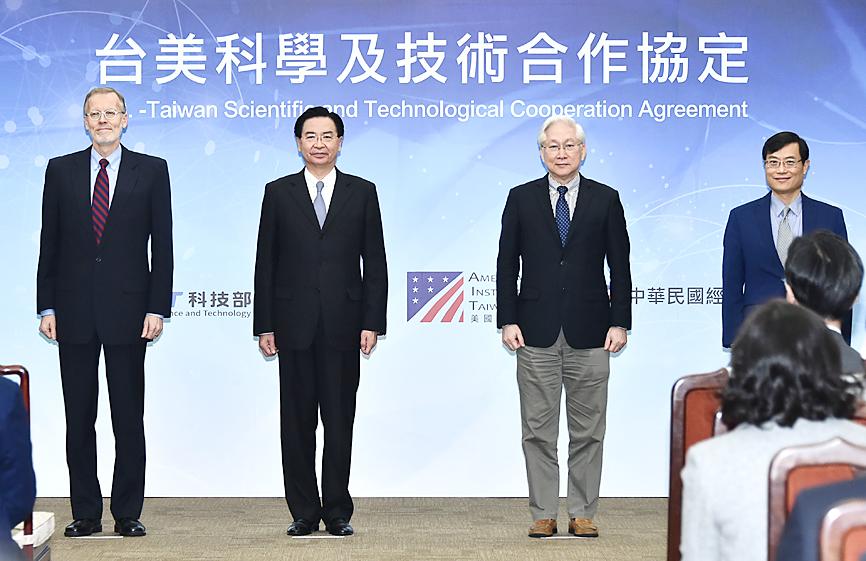Taiwan and the US on Tuesday signed a scientific and technological cooperation agreement, the first concrete result of their Economic Prosperity Partnership (EPP) Dialogue last month, Minister of Foreign Affairs Joseph Wu (吳釗燮) said yesterday.
The agreement was signed by Representative to the US Hsiao Bi-khim (蕭美琴) and American Institute in Taiwan (AIT) Managing Director Ingrid Larson in Washington, Wu told a news conference in Taipei.
Wu said that he was joined in Taipei by AIT Director Brent Christensen, Minister of Science and Technology Wu Tsung-tsong (吳政忠) and Deputy Minister of Economic Affairs Chen Chern-chyi (陳正祺) in witnessing the ceremony virtually.

Photo: Photo: Tu Chien-jung, Taipei Times
In Washington, US Undersecretary of State for Economic Growth, Energy and the Environment Keith Krach, Assistant Secretary of State for East Asian and Pacific Affairs David Stilwell, Bureau of Oceans and International Environmental and Scientific Affairs Acting Assistant Secretary Jonathan Moore, and Science and Technology Adviser to the Secretary of State Chiang Mung (蔣濛) virtually witnessed the ceremony, he said.
That the agreement was signed soon after the dialogue on Nov. 20 reflects the solid trust and cooperation that exist between Taiwan and the US, Joseph Wu said.
“This agreement provides a much needed legal structure for further collaboration to advance scientific research, unleash technological innovation, and ensure research integrity and intellectual property protection,” Christensen said in Mandarin.
Christensen said that he understands how important this agreement is to bilateral relations, as he served as an officer on the environment, science, technology and health affairs at the US embassies in Pretoria and Beijing.
Taiwan and the US are complementary in semiconductor-related areas, as Taiwan’s strengths are semiconductor fabrication, as well as IC design and packaging, while the US’ strength is research and development of advanced chip design, Wu Tsung-tsong said.
Taiwanese researchers are also globally competitive in developing next-generation semiconductor materials and two-dimensional materials, he said.
Later yesterday, the agreement was released in Chinese and English.
Consisting of 10 articles, the agreement covers bilateral cooperation in basic and applied research, innovation, engineering, social science, public health, higher education and scientific human resources capacity.
The agreement says that the nations might decide later to add other scientific and technological areas.
The nations can invite third parties and international experts to join activities held under the agreement, it says.
The agreement enters into force on the date of signature and will be in effect for 10 years, and it is to be automatically extended for another 10 years unless the two parties call for its termination, it says.

FIREPOWER: On top of the torpedoes, the military would procure Kestrel II anti-tank weapons systems to replace aging license-produced M72 LAW launchers Taiwan is to receive US-made Mark 48 torpedoes and training simulators over the next three years, following delays that hampered the navy’s operational readiness, the Ministry of National Defense’s latest budget proposal showed. The navy next year would acquire four training simulator systems for the torpedoes and take receipt of 14 torpedoes in 2027 and 10 torpedoes in 2028, the ministry said in its budget for the next fiscal year. The torpedoes would almost certainly be utilized in the navy’s two upgraded Chien Lung-class submarines and the indigenously developed Hai Kun, should the attack sub successfully reach operational status. US President Donald Trump

TPP RALLY: The clashes occurred near the Chiang Kai-shek Memorial Hall on Saturday at a rally to mark the anniversary of a raid on former TPP chairman Ko Wen-je People who clashed with police at a Taiwan People’s Party (TPP) rally in Taipei on Saturday would be referred to prosecutors for investigation, said the Ministry of the Interior, which oversees the National Police Agency. Taipei police had collected evidence of obstruction of public officials and coercion by “disorderly” demonstrators, as well as contraventions of the Assembly and Parade Act (集會遊行法), the ministry said in a statement on Sunday. It added that amid the “severe pushing and jostling” by some demonstrators, eight police officers were injured, including one who was sent to hospital after losing consciousness, allegedly due to heat stroke. The Taipei

NO LIVERPOOL TRIP: Taiwan’s Lin Yu-ting, who won a gold medal in the boxing at the Paris Olympics, was embroiled in controversy about her gender at that event Taiwanese boxer Lin Yu-ting (林郁婷) will not attend this year’s World Boxing Championships in Liverpool, England, due to a lack of response regarding her sex tests from the organizer, World Boxing. The national boxing association on Monday said that it had submitted all required tests to World Boxing, but had not received a response as of Monday, the departure day for the championships. It said the decision for Lin to skip the championships was made to protect its athletes, ensuring they would not travel to the UK without a guarantee of participation. Lin, who won a gold medal in the women’s 57kg boxing

The US has revoked Taiwan Semiconductor Manufacturing Co’s (TSMC, 台積電) authorization to freely ship essential gear to its main Chinese chipmaking base, potentially curtailing its production capabilities at that older-generation facility. American officials recently informed TSMC of their decision to end the Taiwanese chipmaker’s so-called validated end user (VEU) status for its Nanjing site. The action mirrors steps the US took to revoke VEU designations for China facilities owned by Samsung Electronics Co and SK Hynix Inc. The waivers are set to expire in about four months. “TSMC has received notification from the US Government that our VEU authorization for TSMC Nanjing